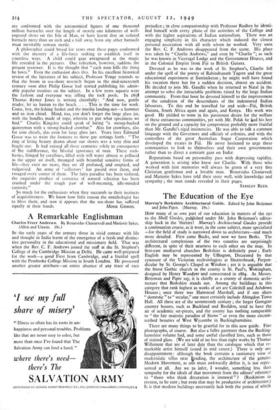A Remarkable Englishman
Charles Freer Andrews. By Benarsidas Chaturvcdi and Marjorie Sykes. (Allen and Unwin. 18s.) IN the early years of the century those in vivid contact with life and thought in India learnt of the emergence of a fresh and distinc- tive personality in the educational and missionary field. That was when the Rev. C. F. Andrews joined the staff at the St. Stephen's College of the Cambridge Mission at Delhi. He came well-prepared for the work—a good First from Cambridge, and a fruitful spell with the Pembroke College Mission in South London. He possessed another greater attribute—an entire absence of any trace of race
prejudice ; in close companionship with Professor Rudhra he identi- fied himself with every phase of the activities of the College and with the higher aspirations of Indian nationalism. There was an engaging simplicity -in his character which induced the closest personal association with all with whom he worked. Very soon the Rev. C. F. Andrews disappeared from the scene. His place was taken by "Charlie Andrews," and soon by "Charlie "; as such he was known in Viceregal Lodge and the Government Houses, and in the Colonial Empire from Fiji to British Guiana.
Devoted as he was to the work of St. Stephen's, Charlie fell under the spell of the poetry of Rabindranath Tagore and the great educational experiment at Santiniketan ; he might well have found his vocation there but for a sudden decision, almost an accident. He decided to join Mr. Gandhi when he returned to Natal in the attempt to solve the intractable problems raised by the large Indian community. From that hour he devoted himself to the improvement of the condition of the descendants of the indentured Indian labourers. To this end he travelled far and wide—Fiji, British Guiana, South Africa again and again, and Kenya. His work was good. He yielded to none in his passionate desire for the welfare of these extraneous communities, yet with Mr. Polak he bad his feet on the ground and a capacity for compromise probably more fruitful than Mr. Gandhi's rigid insistencies. He was able to talk a common language with the Governors and officials of colonies, and with the controllers of the great Australian Sugar Corporation which developed the estates in Fiji. He never hesitated to urge these communities to look to themselves and their own governments rather than to direct a constant gaze on Indiat
Reputations based on personality pass with depressing rapidity. A generation is arising who knew not Charlie. With those who worked with him memories will always be green of a very fine Christian gentleman and a lovable man. Benarsidas Chaturvedi and Marjorie Sykes have told their story well, with knowledge and sympathy ; the man stands revealed in their pages.
STANLEY REED.






























 Previous page
Previous page